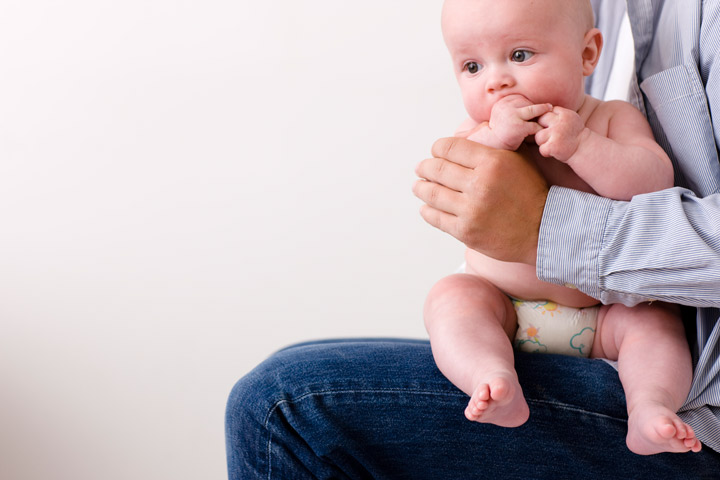TORONTO – Women may be carrying the baby for nine months, but new research suggests expectant dads encounter changes to their bodies in the lead-up to fatherhood.

The changes to a woman’s brain once she conceives are well-documented – she’s flooded with oxytocin as her maternal instincts kick in. Now, American researchers say an expectant father’s hormones go through adjustments, too.
“Other studies have shown that men’s hormones change once they become fathers, but our findings suggest that these changes may begin even earlier during the transition to fatherhood,” lead researcher, Dr. Robin Edelstein, said.
“We don’t yet know exactly why men’s hormones are changing: these changes could be a function of psychological changes that men experience as they prepare to become fathers, changes in their romantic relationships or even physical changes that men experience along with their pregnant partners,” she explained.
READ MORE: How fatherhood changes a man’s brain
Her new research zeroes in on the health of 29 couples with their first baby on the way. Over the course of five visits during the pregnancies, the researchers took saliva samples of their participants so they could measure testosterone, cortisol, estradiol, and progesterone.
Across the board, pregnant women had higher levels of all of these hormones, which was expected. But the researchers noticed that men had less testosterone in their systems.
- VidaSlim products recalled over ‘serious or even fatal’ poisoning risk: FDA
- B.C. medical charity ‘Operation Rainbow’ brings smiles, changes lives in Kenya
- $32.5B settlement with tobacco giants approved by creditors, lawyer says
- Canadians concerned country’s children are too soft, with no coping skills: survey
While the dip in hormones was small compared to their partners, it’s the first time scientists documented prenatal testosterone changes in expectant dads.

Get weekly health news
READ MORE: How motherhood changes a woman’s brain
As Edelstein explained, it’s unclear why these changes were found in the men. He could be sleeping less, the couple could be cutting back on sex, or an expectant dad’s nurturing instincts could be altering testosterone levels, research has speculated. The findings are a piece of a growing body of research on paternal health and its link to baby’s well-being.
So far, the findings suggest that the road to fatherhood isn’t as clear-cut as it is for moms. There’s a learning curve.
Men don’t encounter parenthood the same way as women – they aren’t pregnant for nine months, they don’t deliver their offspring and they don’t breastfeed, all events that prime moms for a lifelong bond they’ll have with their child.
But dad is there, alongside every step of the way.
“Fathers are responding to many cues from their partners — olfactory, pheremonal, gustatory,” Dr. Craig Kinsley told Global News before Father’s Day in June.
Then, there’s their child — or their ‘investment,’ in survival terms.
“Dads play an integral role in the parenting care and protection of their young…once he sees that baby looking at him or grasping his fingertip, and realizing that he or she is his child. It’s a rush,” Kinsley, a father of two, explained. Kinsley’s also a University of Richmond neuroscientist.
READ MORE: How a father’s diet, lifestyle affect his baby’s healthy development
In her research, Dr. Pilyoung Kim documented how daddy’s brain transforms as fatherhood sets in.
His testosterone levels are reduced, so he’s less aggressive and his mating instincts taper off. The reward and motivation regions of the brain grow, making way for those feel-good chemicals to flood their system.
“Those structural changes help increase fathers’ experience with their babies during the postpartum period, that’s our speculation,” Kim, a University of Denver neuroscientist, explained.
Women go through the same thing as their bodies gear up for motherhood. Kim hasn’t noted shrinkage in parts of the brain in women, but she did in men.
READ MORE: Newborn baby’s smell is as addictive as drugs or food, study says
It was in the orbitofrontal cortex — used in critical thinking and decision-making. It’s activated most when we’re stressed, or trying to decipher ambiguous information, Kim explained. So why did this part of the brain shrink in new fathers?
“We were surprised at the findings at first but when we looked more closely it made sense,” she said. As a dad decoded what his baby’s smile, laugh and cry (maybe even smell) meant, perhaps their worries faded away.
“After the first few months, fathers would learn that they can manage the anxiety and stress associated with parenting. It’d become less uncertain,” Kim told Global News.
But it’s a gradual process. Kim said that it can take almost a full year for dads to feel emotionally attached to their babies, unlike moms whose connection is almost instant and visceral. It might be because traditionally, men would immediately go back to work, instead of rearing their child, nursing him, cleaning up after him.
Edelstein’s full findings were published this week in the American Journal of Human Biology.
carmen.chai@globalnews.ca
Follow @Carmen_Chai










Comments